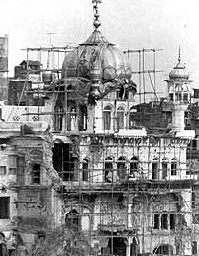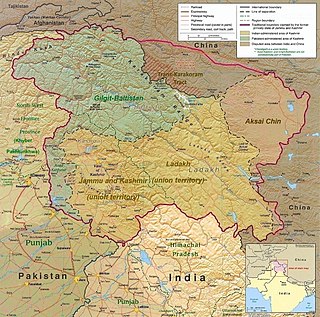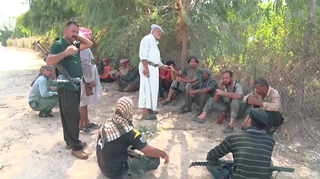The English word militant is both an adjective and a noun, and it is generally used to mean vigorously active, combative and/or aggressive, especially in support of a cause, as in "militant reformers". It comes from the 15th century Latin "warrior" meaning "to serve as a soldier". The related modern concept of the militia as a defensive organization against invaders grew out of the Anglo-Saxon fyrd. In times of crisis, the militiaman left his civilian duties and became a soldier until the emergency was over, when he returned to his civilian occupation.

Operation Blue Star was the codename of a military operation which was carried out by Indian security forces between 1 and 10 June 1984 in order to remove Damdami Taksal leader Jarnail Singh Bhindranwale and his followers from the buildings of the Golden Temple, the holiest site for Sikhs which is located in Amritsar, Punjab, India. The decision to launch the operation rested with the Prime Minister of India, then Indira Gandhi, who had already authorized military preparation for a confrontation at the temple complex 18 months prior according to the then-Vice Chief of the Army Staff, S. K. Sinha. In July 1982, Harchand Singh Longowal, the president of the Sikh political party Shiromani Akali Dal, had invited Bhindranwale to take up residence in the Golden Temple to evade arrest by government authorities.

Socialist Appeal is the newspaper of the British section of the International Marxist Tendency, and also the name used by a group of members and supporters of the Labour Party who organise around the paper.

In some strains of Christian theology, the Christian Church may be divided into:
This page is a partial listing of incidents of violence in the Israeli-Palestinian conflict in 2005.

The insurgency in Jammu and Kashmir, also known as the Kashmir insurgency, is an ongoing separatist militant insurgency against the Indian administration in Jammu and Kashmir, a territory constituting the southwestern portion of the larger geographical region of Kashmir, which has been the subject of a territorial dispute between India and Pakistan since 1947.

The insurgency in Khyber Pakhtunkhwa, also known as the War in North-West Pakistan or Pakistan's war on terror, is an ongoing armed conflict involving Pakistan, and Islamist militant groups such as the Tehrik-i-Taliban Pakistan (TTP), Jundallah, Lashkar-e-Islam (LeI), TNSM, al-Qaeda, and their Central Asian allies such as the ISIL–Khorasan (ISIL), Islamic Movement of Uzbekistan, East Turkistan Movement, Emirate of Caucasus, and elements of organized crime. Formerly a war, it is now a low-level insurgency as of 2017.

The insurgency in the Maghreb refers to the Islamist insurgency in the Maghreb region of North Africa that followed on from the end of the Algerian Civil War in 2002 to the present day. The Algerian militant group Salafist Group for Preaching and Combat (GSPC) allied itself with al-Qaeda to eventually become al-Qaeda in the Islamic Maghreb (AQIM). The Algerian and other Maghreb governments fighting the militants have worked with the United States and the United Kingdom since 2007, when Operation Enduring Freedom – Trans Sahara began. While the 2011 Arab Spring affected support for the insurgency, it also presented military opportunities for the jihadists. In 2012, AQIM and Islamist allies captured the northern half of Mali, until being fought back less than a year later following a French-led foreign intervention, which was succeeded by the Sahel-wide Operation Barkhane. In Libya, the ISIL/ISIS/IS/Daesh was able to control some limited territory during the Second Libyan Civil War, amid allegations of local collaboration between the rival AQIM and ISIL.

The Al-Qaeda insurgency in Yemen is an ongoing armed conflict between the Yemeni government, the United States and their allies, and al-Qaeda-affiliated cells in Yemen. It is a part of the Global War on Terror.

The Sinai insurgency is an ongoing insurgency in the Sinai Peninsula, Egypt, that was commenced by Islamist militants against Egyptian security forces, which have also included attacks on civilians. The insurgency began during the Egyptian Crisis, during which the longtime Egyptian president Hosni Mubarak was overthrown in the Egyptian revolution of 2011.

Beginning in December 2012, Sunnis in Iraq protested against the Maliki government. On 28 December 2013, a Sunni MP named Ahmed al-Alwani was arrested in a raid on his home in Ramadi. Alwani was a prominent supporter of the anti-government protests. This incident led to violence in Al Anbar Governorate between the Iraqi Army and a loose alliance of tribal militias and other groups fighting alongside the Islamic State of Iraq and the Levant (ISIL).
The Militant tendency, or Militant, was a Trotskyist group in the British Labour Party, organised around the Militant newspaper, which launched in 1964. According to Michael Crick, its politics were based on the thoughts of Karl Marx, Friedrich Engels, Vladimir Lenin, Leon Trotsky and "virtually nobody else".

Operation Zarb-e-Azb was a joint military offensive conducted by the Pakistan Armed Forces against various militant groups, including the Tehrik-i-Taliban Pakistan (TTP), the Islamic Movement of Uzbekistan, the East Turkestan Islamic Movement, Lashkar-e-Jhangvi, al-Qaeda, Jundallah and the Haqqani network. The operation was launched on 15 June 2014 in North Waziristan along the Pakistan-Afghanistan border as a renewed effort against militancy in the wake of the 8 June attack on Jinnah International Airport in Karachi, for which the TTP and the IMU claimed responsibility. As of 14 July 2014, the operation internally displaced about 929,859 people belonging to 80,302 families from North Waziristan.
On 2 August 2014, after Lebanese security forces arrested an al-Nusra Front commander, fighters from al-Nusra Front and ISIL surrounded Lebanese Army checkpoints in Arsal before attacking them and storming the northeastern town's police station, where they took at least 16 policemen hostage. The militants then proceeded to take control of the town, and captured two soldiers who were freed by the military later in the day. The fighting continued into the next day and left 30 militants, 10 soldiers and two civilians dead. 25 soldiers were wounded and 13 were missing and presumed captured. Two of the missing soldiers were rescued the same day.
The North Lebanon clashes were a conflict that occurred in October 2014, between the Lebanese Army and Islamist militants in the area of the North Governorate, being also part of the Syrian Civil War spillover in Lebanon.
In late July 2015, the third phase of the Kurdish–Turkish conflict between various Kurdish insurgent groups and the Turkish government erupted, following a failed two and a half year-long peace process aimed at resolving the long-running conflict.

In July 2013, at the same time as mass protests began against the 3 July coup d'état which deposed Mohamed Morsi, and in parallel with the escalation of the already ongoing jihadist insurgency in the Sinai Peninsula, pro-Muslim Brotherhood militants started violent attacks against policemen and soldiers in Central and Western Egypt. In the following months, new Islamist armed groups were created to reinstate Islamist rule in Egypt, like Soldiers of Egypt and the Popular Resistance Movement. Since 2013, violence in mainland Egypt has escalated and developed into a low-level Islamist insurgency against the Egyptian government.

The siege of Marawi, also known as the Marawi crisis, and the Battle of Marawi, was a five-month-long armed conflict in Marawi, Philippines, that started on May 23, 2017, between Philippine government security forces and militants affiliated with the Islamic State (IS), including the Maute and Abu Sayyaf Salafi jihadist groups. The battle also became the longest urban battle in the modern history of the Philippines.

Indian Army operations in Jammu and Kashmir include security operations such as Operation Rakshak, which began in 1990, Operation Sarp Vinash in 2003 and Operation Randori Behak in 2020. Other operations include humanitarian missions such as Operation Megh Rahat and operations with a social aim such as Operation Goodwill and Operation Calm Down. The Indian Army works in tandem with the other arms of the Indian Armed Forces and security forces in Jammu and Kashmir such as during Mission Sahayata or joint operations.

The Islamic State insurgency in Iraq is an ongoing low-intensity insurgency that began in 2017 after the Islamic State (ISIS) lost its territorial control in the War in Iraq. ISIS and allied White Flags fought the Iraqi military and allied paramilitary forces.













